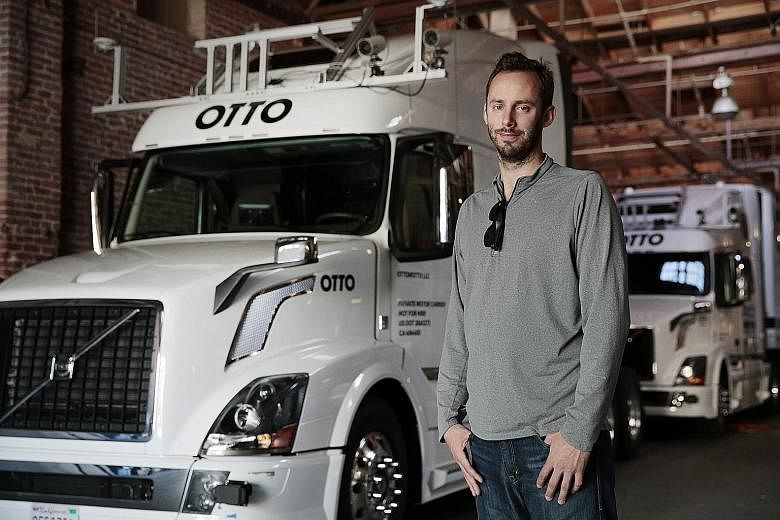SAN FRANCISCO • Late last year, Uber, in defiance of California state regulators in the United States, went ahead with a self-driving car experiment on the streets of San Francisco under the leadership of Mr Anthony Levandowski, a new company executive.
The experiment quickly ran into problems.
In one case, an autonomous Volvo zoomed through a red light on a busy street in front of the city's Museum of Modern Art.
Uber, a ride-hailing service, said the incident was because of human error. "This is why we believe so much in making the roads safer by building self-driving Ubers," Ms Chelsea Kohler, a company spokesman, said in December.
But even though Uber said it had suspended an employee riding in the Volvo, the self-driving car was, in fact, driving itself when it barrelled through the red light, according to two Uber employees, who spoke on condition of anonymity because they signed non-disclosure agreements with the company, and internal Uber documents viewed by The New York Times.
All told, the mapping programs used by Uber's cars failed to recognise six traffic lights in the San Francisco area. "In this case, the car went through a red light," the documents said.
The description of the traffic violation reflects Uber's aggressiveness in its efforts around self-driving cars and the ambition of its project leader, Mr Levandowski, who is now at the centre of a lawsuit brought against Uber by Waymo, an autonomous car business. Waymo is Google's cousin company under their parent entity, Alphabet.
The legal battle also provides a rare glimpse into the high-stakes world of top technology talent, where star engineers like Mr Levandowski, who played a central role in Google's pioneering autonomous car project, command huge sums of money to try to help define a company's technological future.
After leaving Google in January last year, Mr Levandowski formed the self-driving truck company Otto. About six months later, Uber bought Otto for US$680 million ($955 million), and Mr Levandowski became Uber's vice-president in charge of its self-driving car project.
Waymo filed a lawsuit last Thursday in federal court against Uber and Otto, accusing Mr Levandowski and Uber of planning to steal trade secrets. The suit said Mr Levandowski retrieved information from a highly confidential server with designs of crucial technologies used in its autonomous vehicles in the month before he resigned from Google, where he had spent nine years working on maps and self-driving cars.
Alphabet and Uber view autonomous vehicles as using critical technology that may upend the automobile industry.
Google started working on driverless cars at about the time when Uber was formed, and Google is eager to prove that, despite its size and past successes, it can still innovate like a start-up.
For Uber, replacing human drivers with self-driving cars would allow it to theoretically provide safer rides around the clock and avoid one of its biggest headaches: its drivers.
"There's an urgency to our mission about being part of the future," Mr Travis Kalanick, Uber's chief executive, said in an interview in August after announcing Otto's acquisition. "This is not a side project. This is existential for us."
Engineers like Mr Levandowski are part of a limited pool of people with the experience and capability to lead efforts on self-driving cars. They are wooed by traditional automakers looking to acquire new technical talent and tech companies - both established firms and start-ups - which see the opportunity to use artificial intelligence and sensors to disrupt another industry.
"What's in these people's heads is hugely in demand" because the talent pool "just doesn't have enough miles under the wheels", said Ms Martha Josephson, a partner in Egon Zehnder, an executive recruiting firm.
In fact, Mr Sebastian Thrun, who founded Google's self-driving car project and is now chief executive of online teaching start-up Udacity, said last year that the going rate for driverless car engineering talent was about US$10 million a person.
Uber said in a statement that the lawsuit was a "baseless attempt to slow down a competitor", and declined to make Mr Levandowski available for comment.
In an internal e-mail to Uber employees obtained by The New York Times, Mr Levandowski said Otto did not steal any of Google's intellectual property.
"Google says what hundreds of us created doesn't exist," he wrote. "I have worked on self-driving for years. This is my passion."
A Waymo spokesman declined to comment on whether the company would refer its claims to law enforcement.
NYTIMES

